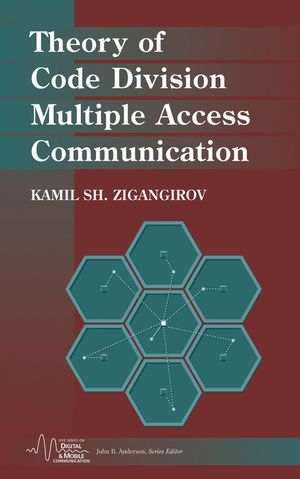Theory of Code Division Multiple Access CommunicationISBN: 978-0-471-45712-1
Hardcover
416 pages
April 2004, Wiley-IEEE Press
 This is a Print-on-Demand title. It will be printed specifically to fill your order. Please allow an additional 10-15 days delivery time. The book is not returnable.
|
||||||
A comprehensive introduction to CDMA theory and application
Code division multiple access (CDMA) communication is rapidly replacing time- and frequency-division methods as the cornerstone of wireless communication and mobile radio. Theory of Code Division Multiple Access Communication provides a lucid introduction and overview of CDMA concepts and methods for both the professional and the advanced student.
Emphasizing the role CDMA has played in the development of wireless communication and cellular mobile radio systems, the author leads you through the basic concepts of mobile radio systems and considers the different principles of multiple access-time division, frequency division, and code division. He then analyzes three major CDMA systems-direct sequence (DS) CDMA systems, frequency hopped (FH) CDMA systems, and pulse position hopped (PPH) CDMA systems. Other topics covered include:
* Spread spectrum (SS) technology
* Forward error control coding
* CDMA communication on fading channels
* Pseudorandom signals
* Information theory in relation to CDMA communication
* CDMA cellular networks
Complete with useful appendices providing analyses of the moments of CDMA system decision statistics, Theory of Code Division Multiple Access Communication is a ready reference for every engineer seeking an understanding of the history and concepts of this key communications technology.
Code division multiple access (CDMA) communication is rapidly replacing time- and frequency-division methods as the cornerstone of wireless communication and mobile radio. Theory of Code Division Multiple Access Communication provides a lucid introduction and overview of CDMA concepts and methods for both the professional and the advanced student.
Emphasizing the role CDMA has played in the development of wireless communication and cellular mobile radio systems, the author leads you through the basic concepts of mobile radio systems and considers the different principles of multiple access-time division, frequency division, and code division. He then analyzes three major CDMA systems-direct sequence (DS) CDMA systems, frequency hopped (FH) CDMA systems, and pulse position hopped (PPH) CDMA systems. Other topics covered include:
* Spread spectrum (SS) technology
* Forward error control coding
* CDMA communication on fading channels
* Pseudorandom signals
* Information theory in relation to CDMA communication
* CDMA cellular networks
Complete with useful appendices providing analyses of the moments of CDMA system decision statistics, Theory of Code Division Multiple Access Communication is a ready reference for every engineer seeking an understanding of the history and concepts of this key communications technology.



